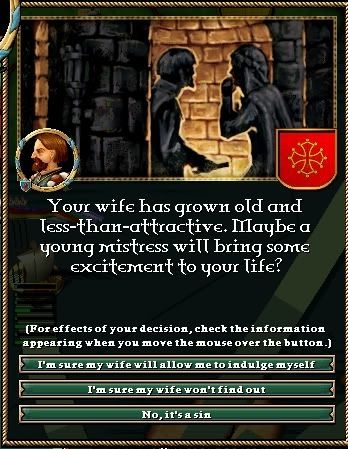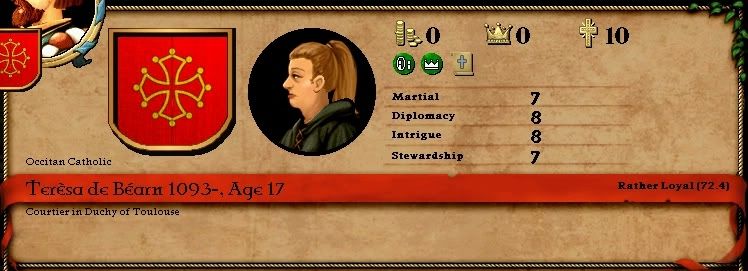Duke Felip quickly tired of his father’s funeral services. Duke Guihem of Toulouse had been a very pious man and had talked at length about the details of which vespers and hymns he would like sung in his remembrance before slipping into his final coma. The rituals were suitably lavish, as would befit one of the leading princes of Christendom, attracting nearly every member of the upper nobility not on immensely pressing business elseware. Duke Felip spent countless hours receiving the most important of these visitors while also making provisions for his household’s permanent move to the capital.
The entire process was a tiresome procedure. Felip’s own appreciation of his father was no small thing yet the constant flow of great personages telling him of how great a man the old Duke had been wore thin on his patience. The new ruler could certainly understand how Guihem had made great strides for the de Toulouse family, seeing their holdings expand greatly while also securing their independence from French tyranny; indeed the son had fought and planned the rebellion side by side with his father. Yet matters of great import were still gathering in the wings while the interminable void of more time spent in limbo stretched out before him. The creation his father had lived to build would crumble less his son was able and willing to maintain it through every means.
“Toulouse Unveiled: The True Story of the Languedoc Middle Ages” by Ermengarde de Auvergne.
June 1109- Jan 1110
Within the meeting chamber stood a good portion of Duke Felip’s advisors, alert and prompt in their attention to protocol as he entered the chamber. Most were familiar faces from the court in Barcelona but Felip had given in to the necessity of holding on to some of his father’s courtiers only after a cold realization that only they were capable of running the various minutiae required of the Toulouse administrative system, at least for now. The Duke never truly trusted an individual before standing with them in some hardship and the fawning his recent arrival in the capital of Toulouse produced among the more ambitious favor seekers was annoying in the extreme for the hard bitten man. All of that would have to wait however as a very important item was currently the center of attention.
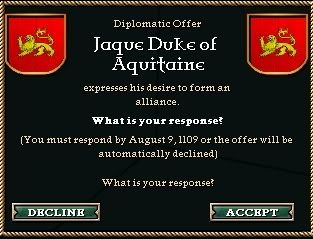
Duke Jaque d’Aquitaine was familiar to Felip in that they had each fought in many of the campaigns over the past years both for and against the French King. While not particularly impressed with the man on an individual level due to what he viewed as numerous character faults, the Duke of Toulouse respected what Aquitaine’s actions had helped accomplish for Toulouse and all Occitan peoples. The rebellion would have been close to suicide without both Toulouse and Aquitaine supporting the other and it only made sense for each to continue watching the other’s back in view of renewed French attention to its breakaway vassals. The problem with such a commitment was that the Aquitaine duke was currently facing drastic resistance to the paradigm shift from his own vassals and Toulouse might easily be caught holding the bag should any rebellion grow strong enough to threaten Bordeaux.
Supporters on each side of the issue debated liberally, striking and counterstriking with arguments for the short and long terms benefits and drawbacks to the various courses that might be taken. In particular, the dukedom’s newly appointed spymaster Odon de Bearn was vehement in his opposition to taking the side of the man who had dispossessed his family. While the duke could appreciate the passion with which Odon held to his well founded grudge, he also needed to take into account the many benefits such a partnership would yield. The certainty of trade benefits and mutual protection between the Occitan nations would outweigh the possibility of intervention should Jaque’s considerable might be challenged from within. The decision to respond to the message in the affirmative left De Bearn silently fuming while the meeting continued with more trivial matters.
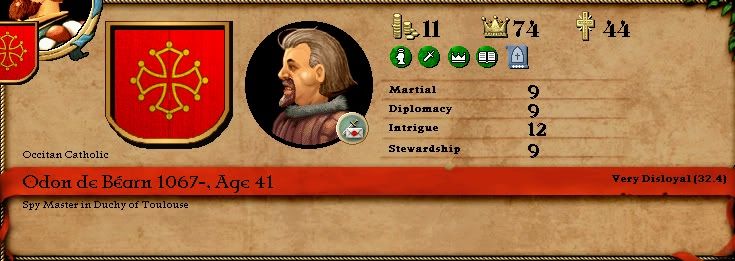
Duke Felip was quite pleased with the outcome of the meeting as a whole and retired for the night with one less worry on his mind. Such action had been advocated by his sister in law Leounora in a private meeting arranged soon after the message initially arrived. His third son’s wife was truly a prodigy in matters of politics and the duke sought her opinion on most major concerns in order to gain a better view of the general direction politics might be blowing. Some might consider scandal when faced with the bare facts of Felipe’s visits with the young women yet the duke considered the action only pragmatic; no one else in his knowledge possessed the women’s capabilities of insight and thus she was a powerful tool to be used in a dangerous game. Felip would make use of her until she was no longer actively useful to the purposes of his securing diplomatic footing.
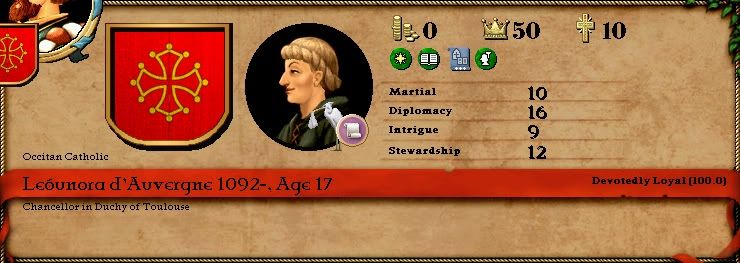
The aftereffects of the seedling alliance between Aquitaine and Toulouse dominated the months following the agreement’s signing. Trade and ideas flowed between the neighboring dukedoms and reports filing in the capital left Duke Felip quite impressed with the scope of Duke Jaque’s ruling style. The concept of feudal holdings had been popularized recently in the Aquitaine, with the duke’s prerogative being an unequivocal step up in efficiently extracting dues from his client lords. While the measures could not be said to be extremely popular with the lower nobility, such control instantly made Felip envious. While the danger of pushing new regulations onto his vassals might seem rash considering his recent rise to station, the Duke was not about to let such an opportunity wait for organized resistance.
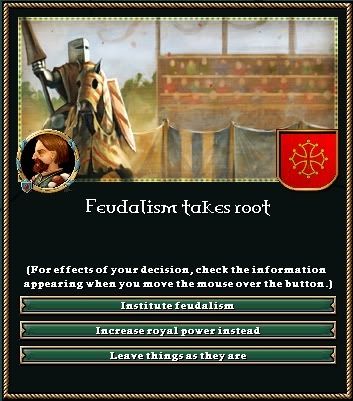
Working together with a holdout from his father’s court, the steward Borel de Toulouse, and acting once more with the advice of his sister in law, Duke Felip worked quickly to pressure his primary noble underlings to renegotiate certain tax factors along with a heap of other regulations regarding land rights. Dressed in arcane language yet seemingly benign for the most part, many of the lords dutifully conceded “rights” that had been due them under the traditional system without exactly knowing what they had given away. It was not long before the effects were clear to all involved; Felip had consolidated considerable power unto his office with a minimum of fuss through careful action and it was likely to stay that way unless ordered from on high. Those few that protested directly were browbeaten with threats of retaliation through even more taxation and the grumbling slowly faded to the background.
Another diplomatic coup was in the making soon after Felip’s success in installing royal prerogative. Hugh Trencavel, Count of Carcassonne, had been one of the most steadfast vassals of Duke Guihem yet that loyalty had not easily transferred to the man’s heir. The simple fact was that their personalities clashed on a number of different levels and each thought the other a poor example of a how a ruler should carry themselves. The Toulousian duke’s efforts to consolidate more power through his underhanded means had not done anything more to endear the Count to his liege. Despite his differences with the man, Duke Felip easily realized that any further hostile effort on his part would make an even worse enemy of the powerful vassal and only an attempt to make a deeper connection with the man could result in any new measure of loyalty.
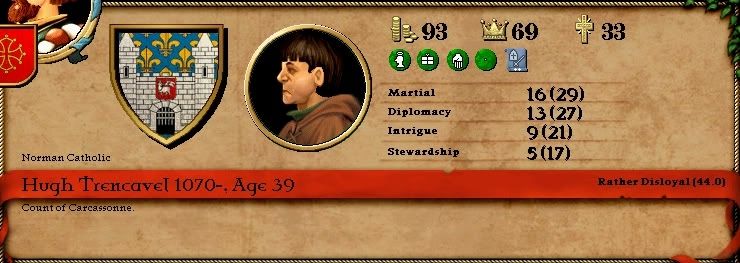
After fully settling into his new lodgings at the Toulouse keep and ensuring the continued smooth operation of administrative means, Duke Felip set himself to hunting in the vast preserves serving the de Toulouse estates in the region. Accompanying him was both Hugh and the Count’s son Radulf, himself the Count of Montpelier. The younger Trencavel was more eager than his older companions and was the first to startle a sizeable boar from its hideout. Failing to control his horse, the young man was thrown nearly straight into the path of the charging creature. Only a strong blow from an arrow fired by the Duke himself knocked the beast from its path and sent it struggling on its way before being brought down by the rest of the hunting party. The fortuitous events saw Count Hugh profoundly thank the Duke for his actions around his son and heir and commit within his own mind a loyalty to the man in spite of what other factors may apply. For Duke Felip, the whole matter had been a convenience of the highest order and he was exceedingly grateful to the boar that had made the encounter possible while feasting upon its haunch later in the dining chamber.
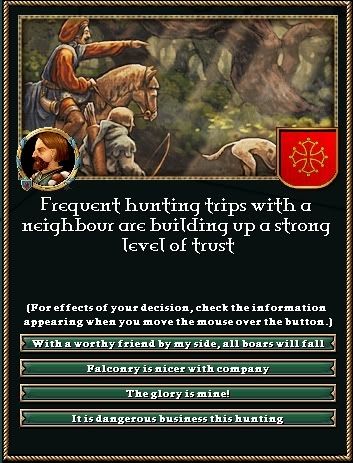
Other, more personal matters, were playing themselves off at court during this time as well. Oton de Toulouse found his days strangely empty as he adjusted to his new role as formal Marshal of the Toulousian levies. Only so much training could be accomplished without taking too many men from the fields at harvest time and the squires undergoing military training were able to hold their own for the most part when it came to training their skills. Instead, the second son of Felip found himself growing closer to his wife as he spent more time with her.
Pregnancy had brightened her normally dour moods and Oton took an increasing interest in the growth and health of their toddler boy as soon as he was born. Both parents, initially forced together for a political match just a few years previously, soon found themselves bonding over the infant and considering their marriage from an entirely different light.
With matters well in hand from the administrative aspect, Duke Felip took the opportunity to streamline matters even further. His estates within the province of Empuries were completely void of any profit due to the ongoing plague in the area and Borel had strongly suggested seeking to gain what he could for their sale as soon as possible.
The Duke took matters one step further, granting title of the lands around that troubled district to Amanieu d’Urgell. As a member of a prime Catalonian family that had fled to the safety of Toulouse after their home’s conquest by the Muslims, d’Urgell was a satisfying candidate for emptying the worthless real estate on. For his part, Amanieu was simply grateful for the chance to rebuild his family’s fortunes even with the most depressing starting point. The result for the Duke would be a loyal and competent vassal in power along with the projection of charity to others that might still be wary of his motives.

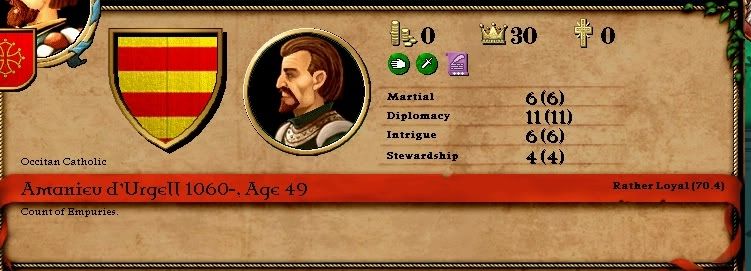
Late in 1109, a diplomatic faux pas left the relationship between Duke Felip and his eldest son Aimeric strongly tensed. The young man had always felt quite entitled by his rank and was often not conscientious of how his prideful will rubbed many of his peers wearingly and his position as Count of one of the richest districts in the realm had done nothing for his modesty. While holding a tournament to celebrate his son Gui’s second birthday, the Count of Barcelona’s champion brutally unhorsed the contestant from Carcassonne, badly injuring the man.
Aimeric coldly observed that such matters were bound to occur when a man so unskilled and ill equipped as the injured party had been were sent up against proper competition. Hugh, the Count of Carcassonne and sponsor of the wounded knight spoke back harshly at Aimeric’s callous tone and it was not long before a match of words escalated to threats on person and property. Still hoping to court the Trencavel’s loyalty through whatever means presented themselves, Duke Felip ordered Aimeric to duly apologize and send his own surgeon to attend the man.
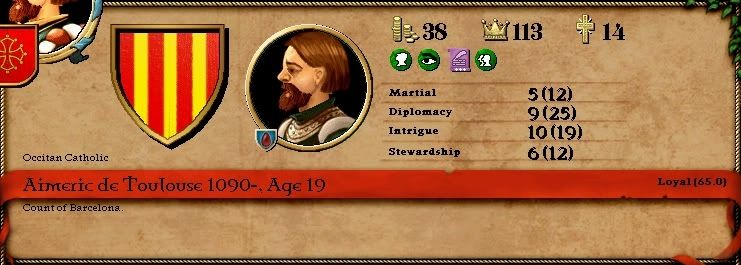

This forced behavior rankled the Count of Barcelona’s pride enormously and he quickly sent strongly worded letters to his father in the aftermath of the episode. Duke Felip’s reception of the messages left much to be desired among Aimeric as his liege returned disparaging remarks of his own. It was not long before Felip would not bear to hear his son’s name mentioned in his presence except in the most important of matters. Aimeric himself was brought to task by his advisors yet would sullenly not affect himself to spend effort rebuilding bridges with his father.
The downturn in his relationship with his son sent Felip into a period of isolation from his wife Margarita; from his point of view she constantly was interfering by speaking as her son’s advocate whenever his situation popped up in conversation. Finally he could stand no more of her and avoided the Duchess as often as possible even during social events.

Duke Felip began to reflect on his relationship with his wife during this time, considering all of the factors that had shaped their time together. Margarita had performed her marital duty well enough, he supposed, with four living sons standing in testament to her womb’s fruitfulness. Yet now she was well beyond childbearing years and Felip considered what he might be able to do in order to sustain his manly vigor in light of his wife’s advancing age. Plenty of sexual escapades with servants had kept him occupied over the twenty years of marriage, but Felip now desired something with more structure than a simple dalliance with some peasant girl.
The answer to his problem presented itself in the form of Teresa de Bearn.

















